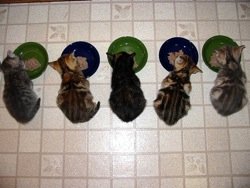|
Cute
Kitten Care > Kitten Food > Feeding Kitten Tips
Tips for Selecting and Feeding Kitten Food
Kittens are not miniature cats - they require special food
specifically
for kittens. Feeding kitten adult cat food will deprive them of the
extra protein, fat, vitamins and minerals available in kitten food. Yes
you can feed your kitten cat food, but you will not be giving him the
best start at a healthy, happy feline life!! Kitten food is higher in
fat, protein and calories than cat food in order to provide the highly
digestible, nutrient dense food they need.
Video on the Importance of Feeding Kitten Food:
The simple answer to "What to feed kittens?" is: from birth to
age 12 months your kitten should be feed kitten specific food, after 12
months you can move your fur ball over to adult food.
1. When your kitten arrives to your home, continue
to
feed them whatever they are used too. If you wish to change
them over to a better kitten food, you will need to do so gradually.
Mix a little of what they are used to with the new kitty food, until
they have moved completely over to the new food. Felines are creatures
of habit, and suddenly changing your kittens food could cause kitten
diarrhea or stomach aches.
2. Be sure to choose a kitten specific food to feed
your
kitten. Your fur ball is at a unique stage in her life, and
she needs the extra "good stuff" provided in quality kitten food.
Feeding your kitten right will help her grow strong and be healthy. Be
sure to have a chat with your kittens breeder, or with your
veterinarian for advice.
3. Small quantities. When kittens are small
they
have small tummies, so generally they eat smaller amounts. You can
leave dry food out so your kitten can "help herself" or you may want to
feed her small amounts each day. If you are unsure what is best for you
and your kitten - have a chat with your veterinarian.

Photo by Little Orange
Crow. (Footer for photo credit)
4. Be consistent. Felines like to know when
and
where something is happening. Feeding kitten at the same time and the
same place will set a good routine and help your kitty to feel safe and
loved.
5. Fresh, clean water needs to be available to your
kitten at all times. Clean water is very important to your
kittens health. Make sure she always has a plentiful supply available
to her.
6. No human food!! No matter how tempting
it
is, don't give your kitty human food. This can cause your kitten to get
a stomach ache and possibly diarrhea. If giving her human food as
treats becomes a habit she could also gain weight.
7. Keep your kittens eating area separate to your
kittens
toilet area. Felines are very sensitive to smell, so setting
up your kittens food next to their litter box is not very nice. How
would you like to take your meals whilst sitting on the toilet?
Note: That adult cats will want to eat the kitten food since it is
higher in fat. This should be avoided, since the levels of vitamins and
minerals in kitten food could promote adult cat obesity and cause
health problems such as crystals in the urinary tract. If you have to
feed one food, select a cat food made for all life stages.
Home made cat food is not recommended since it is difficult to balance
the 40 required food components found in high quality commercial cat
foods. The one exception is a homemade diet recommended by a
veterinarian or veterinary nutritionist to address a specific feline
health concern.
This concern is confirmed by the Centers for Disease Control and Prevention (CDC) and the U.S. Food and Drug Administration (FDA). Most professional veterinarian groups are also opposed to feeding cats raw food. According o to the American Veterinary Medical Association (AVMA), the risk is the raw diets could contain bacteria such as Campylobacter and Salmonella, E. coli.
Healthy Kitten Food Choices
Personally, I like to feed my kittens a quality name brand reputable food made for kittens. So I prefer to
buy
quality pet food rather than a cheaper brand that may be full of
fillers. One recommend brand is Purina
Pro Plan Kitten Food since it
contains all of the nutrients needed by an active kitten.
Kittens benefit from foods formulated for their nutritional requirements.
At a minimum, when shopping for kitten food, seek barnds that are labeled "complete and balanced." This means that the food will provide the kitten with complete nourishment (as opposed to a treat). Check the label and make sure that the kitten food nutritional claims have been checked by a regulatory group such as the American Association of Feed Control Officials. Even store brands that meet these requirements are fine for your kitten.
You will have to weigh up the pros and cons of the different
pet food
choices available for kittens. Be sure to have a talk with your Vet
before making any hard and fast decisions. A Vet will be able to help
you to consider what is best for your kittens health based on her
environment, the climate she is living in and her breed.
For more information download this printable PDF on kitten
feeding tips from the Badger Veterinary Hospital or this brochure
from the Cornell University College of Veterinary Medicine on feeding
your cat.
References
Cornell
University College of Veterinary Medicine
|
